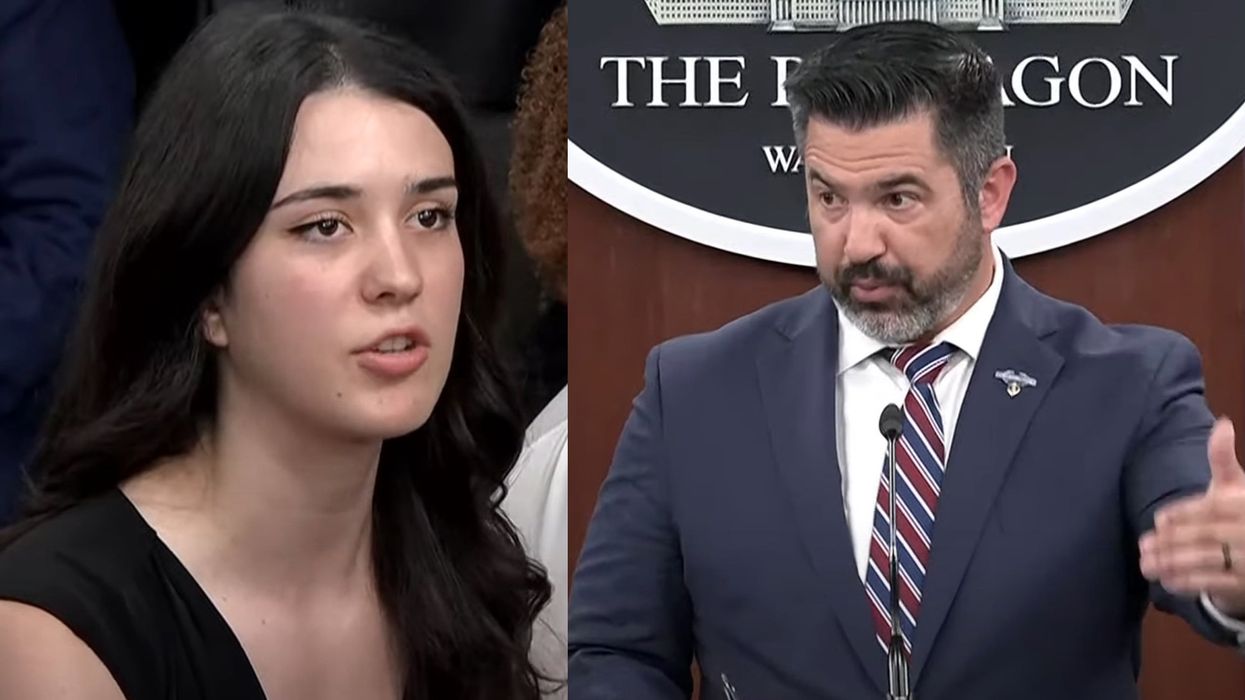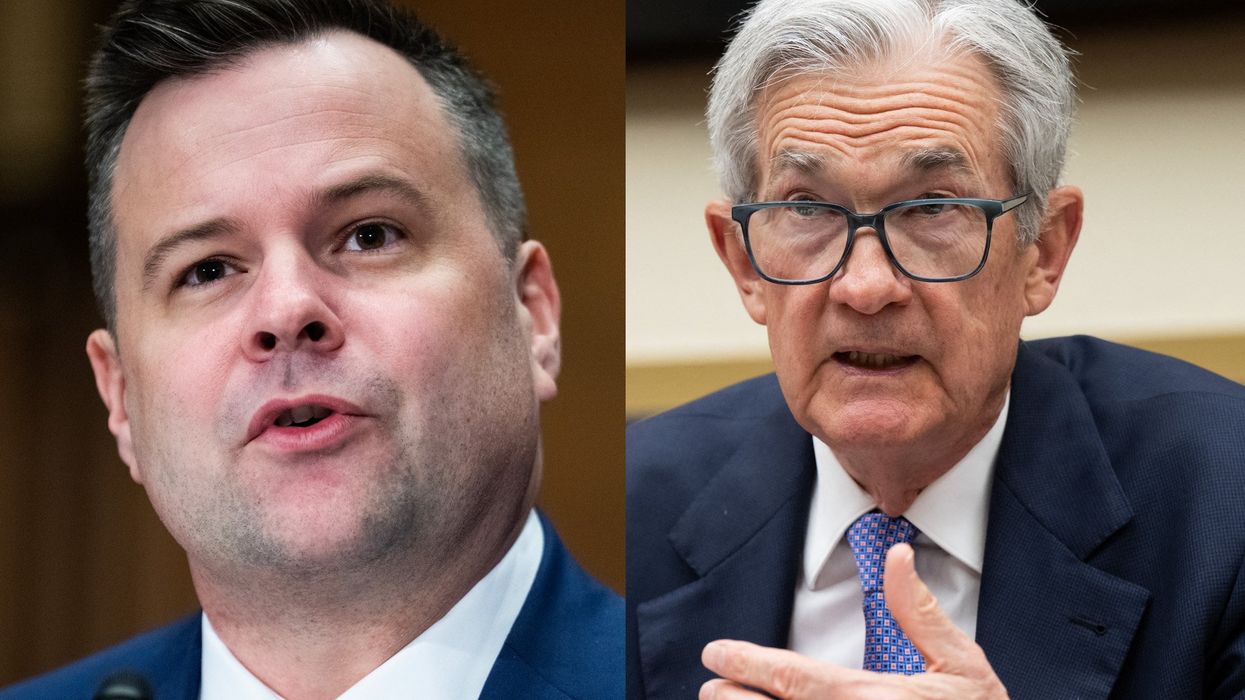
© 2025 Blaze Media LLC. All rights reserved.
Some pundits are now suggesting just printing money and giving it away
September 09, 2014
The founders had other thoughts on the matter...
Vox, the explanatory journalism site with a particularly leftist bent, has an article out endorsing the idea that the Federal Reserve literally print cash and send it to Americans to stimulate the economy.
The idea was initially proposed in an article in Foreign Affairs, published by the prominent Council on Foreign Relations and written by Mark Blyth, a professor at Brown University and Eric Lonergan, a London-based hedge fund manager.
 (Image source: ShutterStock.com)
(Image source: ShutterStock.com)
As Blyth and Lonergan put it, the Federal Reserve's policies to date
have only fed a damaging cycle of booms and busts, warping incentives and distorting asset prices, and now economic growth is stagnating while inequality gets worse. It's well past time, then, for U.S. policymakers -- as well as their counterparts in other developed countries -- to consider a version of [Milton] Friedman's helicopter drops [of money to the public]. In the short term, such cash transfers could jump-start the economy. Over the long term, they could reduce dependence on the banking system for growth and reverse the trend of rising inequality. The transfers wouldn't cause damaging inflation, and few doubt that they would work. The only real question is why no government has tried them.
They continue:
In practice, this policy could take the form of giving central banks the ability to hand their countries’ tax-paying households a certain amount of money. The government could distribute cash equally to all households or, even better, aim for the bottom 80 percent of households in terms of income. Targeting those who earn the least would have two primary benefits. For one thing, lower-income households are more prone to consume, so they would provide a greater boost to spending. For another, the policy would offset rising income inequality.
We could raise a number of objections that sound money proponents and free marketeers more broadly would have to such a policy.
But perhaps the simplest and most fundamental question that needs to be considered in connection with such a scheme is that of what the purpose of money is. As Steve Forbes, with whom we recently spoke, writes in his new book, "Money":
[sharequote align="center"]"[M]oney is not wealth. It is like a scale or a ruler--a measure of value."[/sharequote]
[M]oney is not wealth. It is like a scale or a ruler--a measure of value....Money is a standard of measurement, like a ruler or a clock, but instead of measuring inches or time, it measures what something is worth.
As Henry Hazlitt argued in his essential "Economics In One Lesson," published in 1946 in anticipation of ideas put forth like those proffered by Blyth and Londergan:
[instory-book ISBN="9780517548233"]
In our own day the most persistent argument put forward for inflation is that it will "get the wheels of industry turning" that it will save us from the irretrievable losses of stagnation and idleness and bring "full employment." This argument in its cruder form rests on the immemorial confusion between money and real wealth. It assumes that new "purchasing power" is being brought into existence, and that the effects of this new purchasing power multiply themselves in ever-widening circles, like the ripples caused by a stone thrown into a pond. The real purchasing power for goods, however, as we have seen, consists of other goods. It cannot be wondrously increased merely by printing more pieces of paper called dollars. Fundamentally what happens in an exchange economy is that the things that A produces are exchanged for the things that B produces.What inflation really does is to change the relationships of prices and costs.
Hazlitt concludes chapter 22 of his book, "The Mirage of Inflation," which we recommend be read in full, holding no punches when it comes to his sentiments on inflation:
Like every other tax, inflation acts to determine the individual and business policies we are all forced to follow. It discourages all prudence and thrift. It encourages squandering, gambling, reckless waste of all kinds. It often makes it more profitable to speculate than to produce. It tears apart the whole fabric of stable economic relationships. Its inexcusable injustices drive men toward desperate remedies. It plants the seeds of fascism and communism. It leads men to demand totalitarian controls. It ends invariably in bitter disillusion and collapse.
[sharequote align="center"]"[I]nflation...plants the seeds of fascism and communism"[/sharequote]
Jumping back to Forbes' "Money":
The great periods of job creation and growth throughout history were not responses to changes in currency values. They were the work of entrepreneurs responding to real-world needs by coming up with innovations, from the invention of the steam engine to the creation of the personal computers...one of the most creative periods of technological innovation, the late nineteenth century, occurred during a rare interlude of stable money and unimpeded capital creation, the era of the classical gold standard.
For our money, perhaps most telling is what the founders themselves felt about currency and its debasement. This was perhaps best illustrated in section 19 of the Coinage Act of 1792, which established the U.S. Mint and regulated the coins of the United States. It reads as follows:
And be it further enacted, That if any of the gold or silver coins which shall be struck or coined at the said Mint shall be debased or made worse as to the proportion of fine gold or fine silver therein contained, or shall be of less weight or value than the same ought to be pursuant to connivance of any of the officers or persons who shall be employed at the said Mint, for the purpose of profit or gain, officers or persons shall embezzle any of the metals which shall at any time be committed to their charge for the purpose of being coined at the said Mint, every such officer or person who shall commit any or either of the said offences, shall be deemed guilty of felony, and shall suffer death.
Note: The link to the books in this post will give you an option to elect to donate a percentage of the proceeds from the sale to a charity of your choice. Mercury One, the charity founded by TheBlaze’s Glenn Beck, is one of the options. Donations to Mercury One go towards efforts such as disaster relief, support for education, support for Israel and support for veterans and our military. You can read more about Amazon Smile and Mercury One here.
–
Follow Ben Weingarten (@bhweingarten) and TheBlazeBooks on Twitter and Facebook.
You can find all of our Blaze Books interviews on Soundcloud and Stitcher, and subscribe to our podcast automatically via iTunes.
Want to leave a tip?
We answer to you. Help keep our content free of advertisers and big tech censorship by leaving a tip today.
Want to join the conversation?
Already a subscriber?
Ben Weingarten is a writer, commentator, and editor at large at RealClearInvestigations. He is a senior contributor at the Federalist and writes columns for Newsweek and the Epoch Times.
Ben Weingarten
Ben Weingarten is a writer, commentator, and editor at large at RealClearInvestigations. He is a senior contributor at the Federalist and writes columns for Newsweek and the Epoch Times.
more stories
Sign up for the Blaze newsletter
By signing up, you agree to our Privacy Policy and Terms of Use, and agree to receive content that may sometimes include advertisements. You may opt out at any time.
Related Content
© 2025 Blaze Media LLC. All rights reserved.
Get the stories that matter most delivered directly to your inbox.
By signing up, you agree to our Privacy Policy and Terms of Use, and agree to receive content that may sometimes include advertisements. You may opt out at any time.





